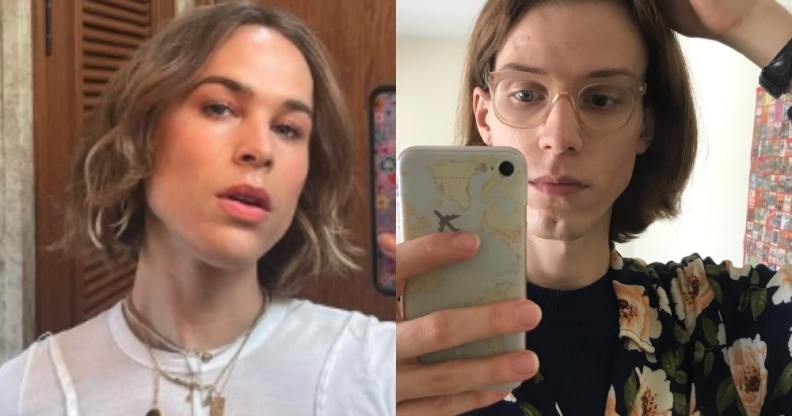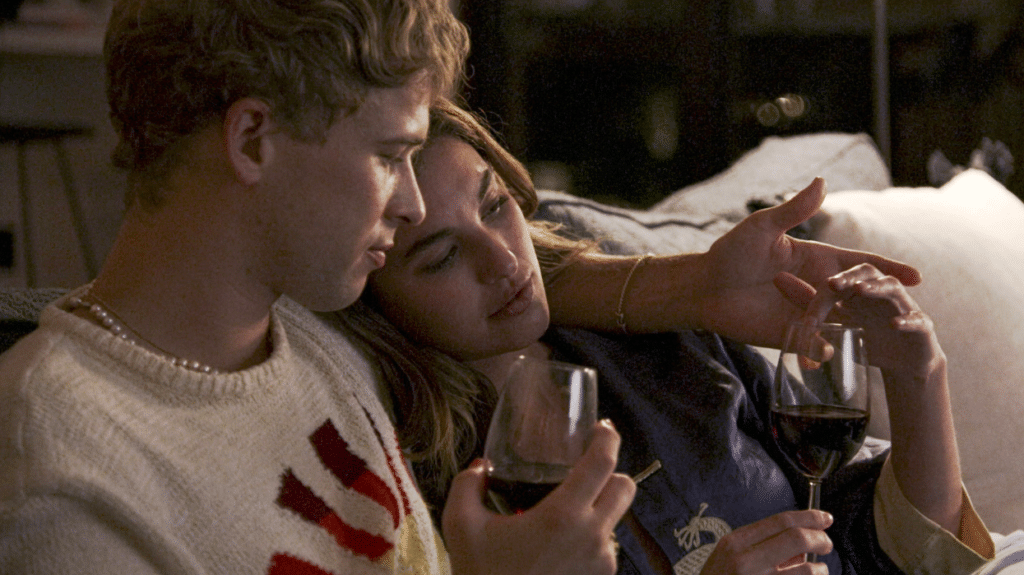13 Reasons Why star Tommy Dorfman helped me explore my own identity like never before

Tommy Dorfman (L) and Filip Kaleta. (Instagram/Supplied)
Filip Kaleta, an ambassador for LGBT+ youth charity Just Like Us, writes for PinkNews about how Tommy Dorfman’s storyline in Love in the Time of Corona gave them a blueprint to realise who they are
If someone had pressed me to describe my identity before the pandemic began, I would’ve said that I mostly felt like a man but that I definitely did not sit on the masculine end of the gender spectrum. Aspects of my physical expression – like long hair, earrings, polished nails, pink clothes – as well as my persona weighed on the feminine scale. Of course, these are only stereotypically seen as feminine traits, but I certainly didn’t associate myself with hypermasculinity.
I was also pretty certain of experiencing only same-sex attraction – but when we suddenly found ourselves with long days locked indoors, I had a lot of time to reflect, and this certainty was gone.
During lockdown, I happened to stumble across the mini-series Love in the Time of Corona.
It stars Tommy Dorfman, who recently came out as a trans woman, as a pansexual, non-binary person named Oscar, who gets romantically involved with their female flatmate, Elle (played by Rainey Qualley). All this on Disney Plus? I couldn’t believe it!
We get a glance at Oscar in the few minutes of the show. They are embroidering a facemask, and we clearly see their stunning pastel blue nails working the material. I am not kidding when I say that it was enough to see Oscar with their nails done for me to get about a metre closer to the screen with my mouth slightly ajar.

Tommy Dorfman and Rainey Qualley in Love in the Time of Corona. (IMDb)
As the show goes on, we see Oscar embracing feminine and masculine fashion choices – like the time when they and Elle record TikTok dances in matching outfits.The pair start off having a codependent friendship, and on the journey to build some boundaries, Oscar discloses that they’ve realised that they’re attracted to more than one gender.
The pair then – spoiler alert – find themselves feeling more for each other than your average friends do.
Oscar themself implies that their pansexuality is something that occurred to them during the lockdown, and it was the same for me. From conversations with my community, it seems that many LGBT+ folks have spent their lockdowns reflecting on their identities.
I remember finishing a movie or a book, still having a couple of hours until bedtime, and just pondering who am I really attracted to – was that female friend I was so drawn to actually a crush, and not your stereotypical GBF (gay best friend) situation?
I came to realise I’d denied myself my attraction to other genders because I was conditioned to believe I had to be completely masculine to have relationships with women and feminine people.
Oscar and Elle are only one of the four interconnected groups that the show follows, so they get roughly a quarter of the screen time but oh boy, was that a quarter of a mini-series when I felt like someone on-screen fully represented me.
It was important for me to see Elle fall for Oscar, as it made me question my belief that I wasn’t masculine enough for the same to happen to me.
Additionally, I felt my experience was validated by Tommy Dorfman’s character, who was fluid in their gender expression, yet acknowledged their attraction to feminine people – something that I had previously not allowed myself to do.
Sadly, this show was so unique for me because Oscar is such a rare character in the media. I can still count the number of fictional queers I’ve strongly related to on the fingers of one hand.
As an LGBT+ ambassador at Just Like Us, the charity for LGBT+ young people, I have started returning to my volunteering in schools and giving (virtual) school talks, after the pandemic temporarily postponed in-person visits. I speak about LGBT+ representation and why it matters so much in my talks.
I keep my fingers crossed that as more young people with diverse sexual orientations and gender identities go through this world, they see themselves better represented in the media. I don’t want anyone to have to wait until the age of 22 to feel seen – no matter how grateful I am to see Tommy Dorfman on screen.
If you’re LGBT+ and age 18–25, you can volunteer as a Just Like Us ambassador. You’ll get training to speak in schools to help combat anti-LGBT+ bullying – sign up now.

